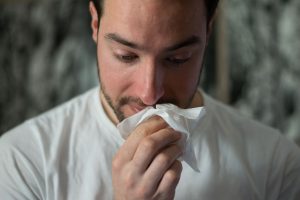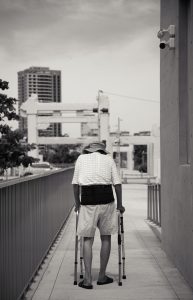Allergies
Refuting the “Man Cold” Cliche

Well, if Covid and seasonal allergies had a lovechild its name would apparently be the upper respiratory pathogens of Winter, 2023. I experienced both personally and professionally, not only the severity of these viruses’ symptoms, but maybe even more troubling was how stubborn they were to resolve. Coughs that would linger for weeks on end, allergies turned to sinus infections, and one friend had the shingles virus transform into a vicious cough, which in my humble opinion occurred because he didn’t properly treat the former with Chinese Medicine.
I am grateful we seem to be passing simultaneously, likely not coincidentally, out of this post-pandemic ripple effect along with the cold weather. Besides dilating the blood vessels of our respiratory microbiomes, thereby giving pathogens wider exit pathways, the warm air should eventually aid in transforming latent mucus and boosting our metabolic energies enough to in turn boost our immunological energies, or “wei qi.”
I plead ignorance, in the past few years more than ever, to most current events, trends on social media, philosophical platitudes, and pop culture; and I often question whether that makes me an “ignorant person”—especially since we will all eventually die still relatively ignorant about most things and peoples. Besides my family, I devote most of my time and mental energy to Chinese Medicine. Whatever is left over at the end of each day are mere scraps, an hour or two at most, and I choose to shut my mind off with friends and/or sports. Maybe in another chapter of my life I’ll read more articles and keep up with external themes and events.
Before blowing my own nose about 50 times a day one week back in January, my lungs exacerbated by the need to rid themselves of phlegm, I had never heard of “the man cold.” Apparently, amongst the infinite social media cliches is one that guys are overly dramatic or whiney about their common colds, obviously underscoring “girl power,” which is a great thing, but also the idea that men are weak(er), which might not be great, or accurate.
Recall the first wave of Covid, we were quickly informed that men, along with the elderly and obese, were most susceptible to severe infections. Why? Well, from a Chinese Medical perspective men have more heat and/or yang qi in the body’s upper region. On one hand it is why we are fortunate enough to have generally more energy. It is consistent with our generally superior upper body strength; though it is also why the inflammatory cytokine response is more intense in the context of upper respiratory viruses.
If you require this be translated in conventional medical terms—and most westerners do—as a result of our increased testosterone and androgens, men possess higher numbers of T cells and Natural Killer cells than women, whereas women have greater B cells, neutrophils and phagocytic activity, which makes them more adept at clearing viruses, as well as the toxins from vaccines. Women also have a greater susceptibility to dysregulation of innate lymphoid cells, which makes them generally more prone to autoimmune disease. (source: https://www.nature.com/articles/nri.2016.90.pdf)
Returning to the brilliant simplicity of Chinese Medical jargon: It is the heat from our body’s (masculine) yang qi that provides ample metabolic strength to regulate our lymphoid cells and avoid autoimmune disease. It is that same heat, left uncontrolled, that creates a more inflammatory cytokine storm in the lungs and makes clearing external pathogens more stubborn. It’s not because your husband is being a little bitch.
Spring Season and Moving Day!

Despite the northeast weather forecasts consistently looking more like a frightening EKG than a directly corresponding line with the seasons, Spring is here and we can expect to feel the climactic difference on at least most days relatively soon.
The Spring season corresponds with the wood element, which corresponds with the emotion of anger or frustration, which corresponds with our liver and gallbladder meridians, which might incite symptoms such as temporal headaches, rib-side pain or cramping, dryness in the chest or throat (I lost my voice this past week for the first time in probably a decade!), cold feet in spite of a warm body, the shingles virus, lack of appetite for breakfast, or exaggerated PMS symptoms for women.
The seasonal increase in our liver and gallbladder qi, respectively, makes us more prone to anger and irritability, which can make us more prone to any of these symptoms, which of course creates a vicious cycle—especially for those of us considered “wood element constitutions,” such as myself. “Wood people” tend to be active and potentially temperamental, with a wiry, sinewy build like, well… wood.
Interestingly one of the most common pulse qualities Chinese Medicine recognizes is the “wiry pulse,” because it feels like a taut wife beneath the pads of the finger. When we feel this we often assume that the liver or gallbladder channels are implicated in the etiology of disease.
The best ways to mitigate these “side effects of Spring” are through a healthy amount of exercise—enough to circulate the liver qi without over-sweating and drying out the stomach—and mostly warm foods that are easy to digest. In Classical Medicine liver and gallbladder pathologies are a result of the stomach being completely dried out of healthy fluids, then sending pathogenic heat/inflammation upwards (see aforementioned loss of voice). The one exception to the warm rule these next few months would be in the form of sauerkraut, vinegars, and pickled foods, which along with mildly spicy foods are said to course the liver qi.
As for my own apparent stress variable, (my wife and) I will be moving next week to live in a suburb for the first time in 27 years! Excitement, along with fear and anxiety are likely more prominent within me than anger or frustration, but as a “wood-type person” navigating this seasonal wood transition, it stands to reason that for me such symptoms would arise.
We bought a home in the “coolest,” most culturally diverse suburb still with a good school system that we could find, in South Orange, NJ. One of my favorite mentors’ tai chi school is a 10-minute drive away and we have a 5-minute walk from our house to the NJ Transit stop, which is 40 minutes direct to Penn Station, which is then a 15-minute walk to my office. Not bad! Also, the previous owner happened to be a famous Buddhist monk who founded the Tibet Center on the lower east side. Many cool check-offs on this resume, however I’ve always been a “New York or Nowhere” person, so the great unknown, coupled with all the stressors of renovations and moving with a toddler surely went straight to my throat. Wish us luck!
The “Unresolved Exterior Pathogen”

I think one of my favorite concepts in Chinese Medicine is that of the “unresolved exterior pathogen.” What does it mean? When we catch a cold, whether bacterial or viral, most cases should be vented, sweated out, while we rest as much as possible and consume warm foods, such as the classic chicken soup to support our “wei qi,” or immunological cellular energy.
Obviously most modern people do not do this. We take over-the-counter cough suppressants, congestion suppressants, anti-pyretics, and every other suppressant to make us feel as comfortable as possible until the cold resolves… or at least appears to.
This is a totally understandable mistake. First of all, most people don’t know that Chinese Medicine can treat the common cold (along with nearly everything else under the sun), and even if they did herbalists and herbal medicine are not readily available to most.
From a Chinese Medical perspective when a cold is suppressed it gets pushed deeper into the body, from the “wei qi” or immunological layer, to the organs and metabolic layer. Anyone have digestive issues since having Covid-19? This is an “unresolved exterior.”
More common symptoms of unresolved pathogens include rheumatological, dermatological, or orthopedic; autoimmune joint pain being the most self-explanatory, which makes orthopedics not far behind it. Lingering “dampness,” residual plaques or mucus from an exterior pathogen go latent, and if we’re lucky enough that they don’t create the kind of molecular mimicry to over-activate our immune system they may lodge into our muscles, tendons, and ligaments. While neck and back pain during a common cold are well-known, pay more attention to such symptoms that linger in their wake. It usually indicates fluids that should have been sweated out are trapped wherever we happen to be orthopedically most vulnerable.
Thankfully, we’ve gotten to a point where few people are any longer terrified or paralyzed by Covid-19. Most of us are more or less going about our lives taking varying precautions—this doesn’t mean we cannot at the same time respect our opponent.
After I had Covid I continued to consult and get treated by mentors for at least one month after symptoms resolved, with the obvious intention of prevention and full resolution, not just from a biomedical standpoint, but from a more neurotic, perfectionist Chinese Medical assessment. I wanted to ensure that my tongue looked like my tongue again—also that we took steps to avoid any of my own constitutional proclivities from rearing their heads as a result of any unresolved inflammation.
While going through Chinese Medical school it was fascinating to think that my eczema and ski conditions that I’d had all my life may have been a result of an improperly treated cold I had as a baby. Or to view my low back or knee pain as not something relegated exclusively to the orthopedic surface and/or old athletic injuries, but connected to my systemic inflammation. I beg your pardon for my broken record tendency in refutal of one my greatest pet peeves:
“Holistic” does not mean everything alternative, “New Agey,” nor related to spa treatments, nor gentle or weaker than biomedicine. It means analyzing all symptoms and systems as interconnected and the incredibly more challenging task of treating accordingly.
To schedule a FREE INITIAL CONSULTATION CLICK HERE
Acupuncture Can Help You Deal with Allergy Symptoms

Research tells us that acupuncture has been beneficial in treating a variety of conditions including high blood pressure, stress and anxiety, and headaches, just to name a few. And the good news is, you can add allergy symptoms to that list as well. continue reading


